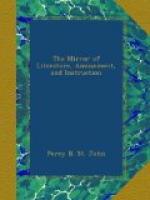The slave in eastern countries, after he is trained to serve, attains the condition of a favoured domestic; his adoption of the religion of his master is usually the first step which conciliates the latter. Except at a few seaports, he is seldom put to hard labour. In Asia these are no fields tilled by slaves, no manufactories in which they are doomed to toil; their occupations are all of a domestic nature, and good behaviour is rewarded by kindness and confidence, which raises them in the community to which they belong. The term gholam, or slave, in Mahomedan countries, is not one of opprobrium, nor does it even convey the idea of a degraded condition. The Georgians, Nubians, and Abyssinians, and even the Seedee, or Caffree, as the woolly-headed Africans are called, are usually married, and their children, who are termed house-born, become, in a manner, part of their master’s family. They are deemed the most attached of his adherents: they often inherit a considerable portion of his wealth; and not unfrequently (with the exception of the woolly-headed Caffree) lose, by a marriage in his family, or by some other equally respectable connexion, all trace of their origin.
According to the Mahomedan law, the state of slavery is divided into two conditions—the perfect and absolute, or imperfect and privileged. Those who belong to the first class are, with all their property, at the disposal of their masters. The second, though they cannot, before emancipation, inherit or acquire property, have many privileges, and cannot be sold or transferred. A female, who has a child to her master, belongs to the privileged class; as does a slave, to whom his master has promised his liberty, on the payment of a certain sum, or on his death.—Sir J. Malcolm’s Sketches of Persia.
* * * * *
The Gatherer.
“I am but a Gatherer and disposer of other men’s stuff.”—Wotton.
LEVEES.
Secretaries of state, presidents of the council, and generals of an army, have crowds of visitants in a morning, all soliciting of past promises; which are but a civiller sort of duns, that lay claim to voluntary debts.—CONGREVE.
* * * * *
PERVERSE PUN.
The other day as Kenny was dining at a friend’s house, after dinner wine being introduced and Kenny partaking of it, was on the instant observed to cough immoderately, when one of the company inquired if the cause was not owing to a bit of cork getting into the glass; to which Kenny replied, “I should think it was Cork, for it went far to Kill Kenny.”
P.K.R.
* * * * *
AUTHORS AND EDITORS.
“Do you hear, let them be well used.”
SHAKSPEARE.




